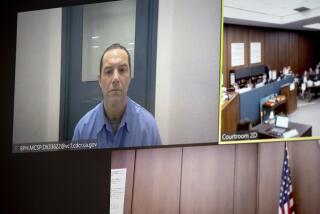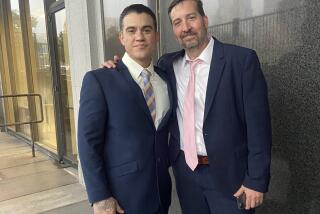Judge Refuses to Excuse Himself in Retrial of ’94 Slaying
- Share via
SANTA ANA — Despite the prosecution’s qualms that he will not be impartial, a judge on Friday refused to remove himself from the retrial of Earl Rhoney, accused of murdering an Irvine woman during a burglary in 1994.
Superior Court Judge Anthony J. Rackauckas Jr. made the controversial decision this month to overturn a jury’s verdict that could have resulted in the Rhoney, 20, being sent to prison for life without parole for the killing of Patricia Lea Pratt, 46.
Rhoney’s December 1996 conviction was unprecedented in a California court because it hinged largely on a bloodhound sniffing evidence authorities had gathered through the use of a “scent machine.”
Pratt was found strangled and beaten in her Turtle Rock home on Jan. 20, 1994. Police targeted Rhoney two weeks after the slaying when he was picked up for an unrelated burglary in the community, near where he lived with his grandfather.
The key prosecution evidence in the murder case came from a machine that investigators say extracted Rhoney’s dead skin cells from the victim’s clothing. The extracted matter, known as scurf, was transferred onto a gauze pad and then frozen for safekeeping.
Nine months after Pratt’s slaying, a bloodhound named Duchess sniffed the pad and then followed Rhoney, as he walked free from Juvenile Hall after serving time for an unrelated burglary. Officers arrested Rhoney, then 17, at a nearby shopping mall as he made a phone call.
During the first trial, Rackauckas had allowed the bloodhound evidence to be presented even though prosecutors did not meet all the traditional criteria for allowing such evidence. The judge said testing of the machine had convinced him that those criteria could be “stretched.”
But March 10, the day that Rhoney was to be sentenced, the judge stunned those connected to the case by ordering a new trial.
Rackauckas said it became clear during the trial that the scent machine evidence was dependent upon the credibility of the dog handler, Larry Harris. The judge said Harris was a biased witness who refused to consider whether the dog could be mistaken.
“If that’s the court’s view, it places us in an untenable position,” Deputy Dist. Atty. James Mulgrew said in court Friday. “We strongly disagree with the court’s position on this witness. It places us in a very difficult situation.”
If the bloodhound evidence is allowed and a second jury finds the dog handler’s testimony credible, prosecutors fear a repeat of the first trial.
Prosecutors said they will try hard for another conviction when Rhoney goes to trial in May. But their case could be significantly weakened if they are not allowed to introduce the bloodhound evidence.
“Our concern is that the fact that the court appears to be of the belief that this witness would never be credible and we’d like to at least be able to give it another shot,” Mulgrew said.
But Rackauckas was unswayed, saying that it is “not unusual to deny evidence, and it does not indicate bias.”
More to Read
Sign up for Essential California
The most important California stories and recommendations in your inbox every morning.
You may occasionally receive promotional content from the Los Angeles Times.













